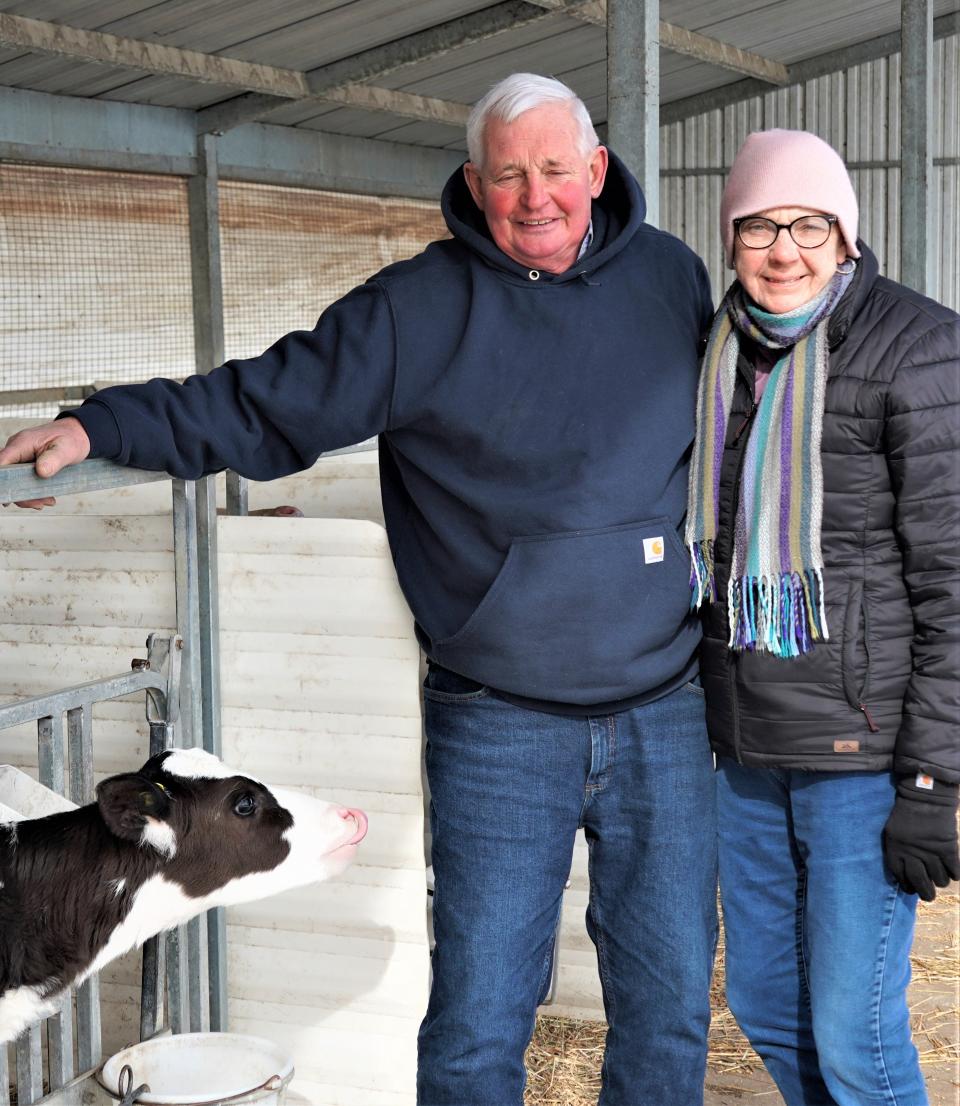WANTAGE — Richard Byma grew up on a small family dairy farm in northwestern Sussex County and didn’t think of doing anything else in his life but running a dairy farm.
Sitting at the dining room table in his farmhouse along Route 519 on a cold February afternoon, he pointed out the window across windblown fields at a red barn a quarter-mile away.
“That’s where I grew up. My father owned that farm,” he said. As did many farm boys of that 1960s era, Byma went to the newly opened “Vo-Tech,” what is now called Sussex County Technical School.
Advertisement
Advertisement
Today, he and his wife, Rosina, are the 2025 New Jersey Farmers of the Year, an honor bestowed at the 100th State Agricultural Convention earlier this month. Also recognized by the state Board of Agriculture were former state Agriculture Secretary Douglas Fisher and, posthumously, John Rigolizzo Jr. of Gloucester County.

Richard and Rosina Bymas stand by the sheltered, open air calf pens “on the sunny side of the barn” at By-Acre Holsteins, the farm they own with family in Wantage. Earlier this month, they were named Farmers of the Year at the New Jersey State Agricultural Convention.
At the meeting, current Agriculture Secretary Edward Wengryn said, “The dedication and service that each of these individuals have given to New Jersey agriculture make their recognition well deserved. Their common thread of using their roles and resources to educate and advance our industry provide a solid foundation for the future of agriculture here in the Garden State.”
Richard Byma was one of the movers behind the Sussex County Farm & Horse Show’s purchase of the McDonald’s farm on Augusta Plains Road. The site would become the home of the annual State Fair and Sussex County Farm & Horse Show. Before the purchase, the horse show was held on the grounds of what is now Selective Insurance.
It would be almost a decade before development of the McDonald’s farm into the fairgrounds began with creation of the pond onsite and several access roads. The Farm & Horse Show formally moved to its new home in 1976.
Advertisement
Advertisement
In the meantime, Richard and Rosina got married and began renting a farm owned by the Ayres family. They bought the property in 1975, and Richard said, with a chuckle: “We probably paid way too much.”
When they bought the farm, they were milking a herd of 75 cows. Today, they have 127 milking cows, three bulls and several calves in special pens.
“We built those pens on the sunny side,” Richard said, pointing to the February sun that warmed the outdoor enclosures. His calves poked heads through the metal gate slats, and a small herd of barn cats gathered in the sunshine.

Rosina and Richard Byma pose on the deck of their farmhouse overlooking By Acres Holsteins, the farm they own in Wantage. The couple were named by the state Board of Agriculture as Farmers of the Year at the annual convention earlier this month.
Between their ownership and renting, the Bymas now farm more than 600 acres and continue to educate the public, not only through support of the horse show but also through tours of their farm.
Advertisement
Advertisement
More in U.S.
Reacting to the Bymas being named Farmers of the Year, state Sen. Parker Space, who is a township neighbor, said, “Sussex County has a rich agriculture heritage thanks to families like the Bymas who have farmed the county soil and tended to its livestock for generations. The Space family has known the Bymas for many decades, and it is especially fitting that they be recognized so prominently by the state for their impact in the community.”
The senator said the Bymas have promoted local agriculture and the dairy industry by hosting events such as a venison dinner each March. They also run an on-farm greenhouse that sells plants throughout the summer.
State Assemblyman Michael Inganamort attended the awards dinner and presented the Bymas with a citation of commendation on behalf of the 24th Legislative District.
Rosina, he said, has organized, guided and managed the dairy show and the dairy barns at the fair for many years and is known for her generosity in helping youth in the 4-H Program. Richard, he noted, has served for decades as director of the fair’s milking parlor, an interactive exhibit that shows the process of milking a dairy herd.
Advertisement
Advertisement
Richard Byma is also a longtime member of the Fair Foundation, which raises money for improvements to the fairgrounds.
Fellow 24th District Assembly member Dawn Fantasia said, “I am so pleased to see the Bymas honored for their lifetime of dedication to agriculture. Dairy farming, a hallmark of New Jersey’s agricultural industry, plays a vital role in supporting our local economy and ensuring food security. Families like theirs inspire us to champion strong agricultural policies in the Legislature.”
Their son, Henry Byma, is also an owner of the farm and was New Jersey’s Outstanding Young Farmer Award winner a decade ago.
In 2007, the Bymas partnered with their son, his wife, Christine, and grandson Richard to form By-Acre Holsteins, making it a four-generation dairy farm.
Advertisement
Advertisement
The elder Richard said modern dairy farming requires a much broader knowledge today, with computers keeping track of not only how much milk an individual cow produces but also the animal’s genetics — in connection with past and future generations — and the overall quality of the milk, such as butterfat content.
He said the computers also help in breeding new generations of calves, helping the farm decide when to buy semen and inseminate cows.
“With the computer, we can pick butterfat content, milk protein. The last 10 years we’ve done all that,” he said. A cow is productive for only about seven to eight years.
Story continues after video.
And while they are milking only 127, the farm also has 280 head of Holsteins, including three bulls, on the property with the non-milking cows either in the process of growing up or calving.
Advertisement
Advertisement
“We’re growing our young calves to be better than their mothers,” Richard said.
Herd health is important, so every calf is inoculated and given respiratory treatment, he added: “Viruses. You can’t smell them, you can’t see them, but they are all around.”
While dairy genetics are moving forward, so is the process of farming.
“The pasture gets hot,” Richard said, adding that hot, stressed cows give less milk.
In today’s more modern, “big herd” farming operations, cows don’t go outside, but are fed, milked and have down time in the same no-stall, open-air shelters, where they habitually line up at feed troughs, then walk into milking stalls on their own.
Watching for signs of bird flu
And on a new national worry, he said there’s “no sign, yet,” of avian flu crossing over into other animals, especially dairy herds, in the eastern U.S., but farmers are on the lookout. Bird flu cases have been confirmed in dairy cows in the west.
Advertisement
Advertisement
More: Hardyston rejects state’s affordable housing goal. What happens next?
“Everyone’s concerned,” Richard said, explaining that the spring migration has yet to start. Of particular concern are black starlings, which have an affinity for the dairy feed supply.
He said he has seen many other changes in the state’s dairy business over his career. In 1916, he said, there were 20,000 dairy cows in Sussex and 36 processing plants, or creameries. Today, his milk is trucked to a creamery in Connecticut.
The 2022 U.S. agricultural census shows 24 dairy farms in Sussex County with 1,112 cows. A farm, however, is defined in the census as any place that produces $1,000 or more of agricultural products during the year.
Advertisement
Advertisement
The dairy business “is so much better today, so much more,” he said, “but it still takes men, workers, people to work a place.”
Email: bscruton@njherald.com; Twitter/X: @brucescrutonNJH
This article originally appeared on New Jersey Herald: NJ Farmers of the Year are Sussex couple with 50 years in dairy
EMEA Tribune is not involved in this news article, it is taken from our partners and or from the News Agencies. Copyright and Credit go to the News Agencies, email news@emeatribune.com Follow our WhatsApp verified Channel




